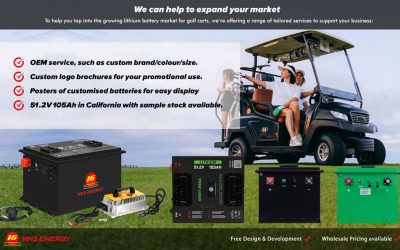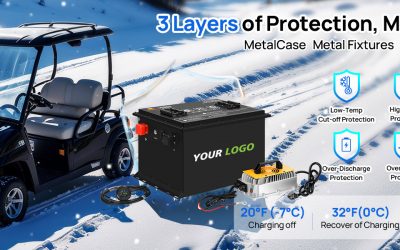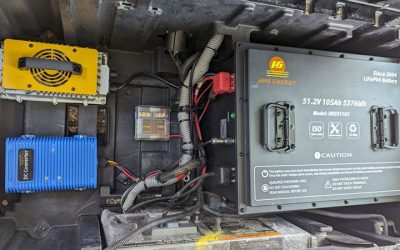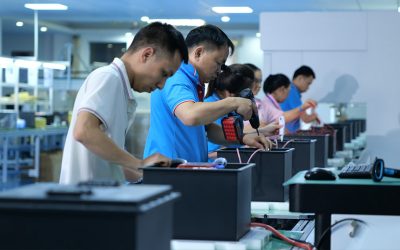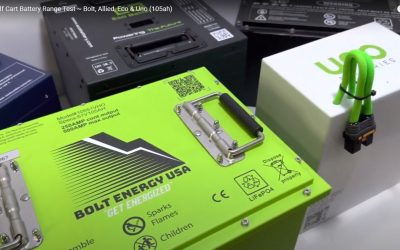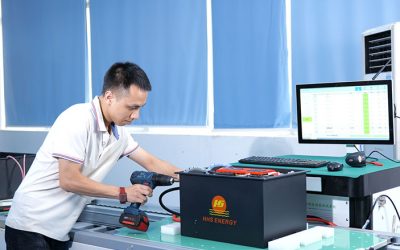⚡ The Future of 48V Golf Cart Batteries
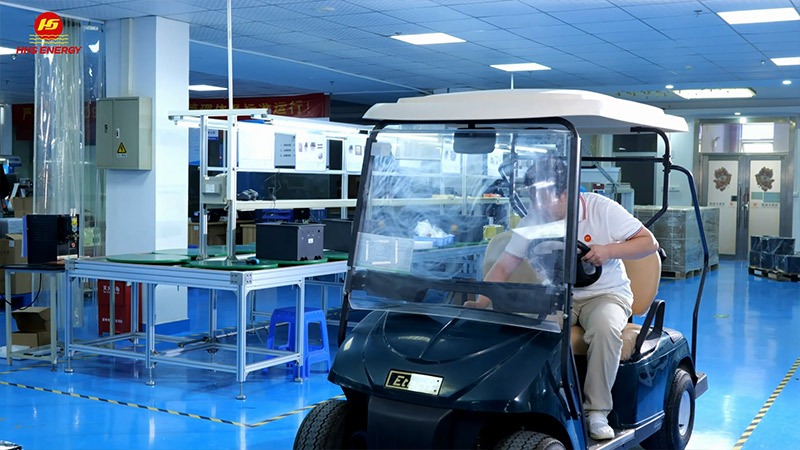
Golf carts have come a long way from being simple, low-speed vehicles for the greens. Today, they’re used in gated communities, resorts, campuses, factories, and even off-road environments. At the heart of this evolution is one critical component — the golf cart battery.
Among all voltage systems available, the 48V golf cart battery has emerged as the industry’s preferred standard, balancing power, efficiency, and range. But as lithium technology continues to advance, the future of 48V systems looks brighter than ever.
In this article, we’ll explore how 48V golf cart batteries are evolving, what makes lithium the dominant force, and why companies like HHS ENERGY are setting the benchmark for the next generation of electric mobility.
⛳ Why 48V Systems Dominate the Golf Cart Market
In the world of electric golf carts, voltage determines both power output and efficiency. Compared to older 36V systems, 48V models offer several advantages:
-
Higher Torque and Speed: More voltage means more power to climb hills and handle heavier loads.
-
Improved Energy Efficiency: 48V systems draw less current for the same power, reducing cable heat and energy loss.
-
Longer Range: Better efficiency translates to longer driving distances per charge.
-
Modern Compatibility: Most new golf carts and lithium battery conversions are designed around the 48V platform.
This makes 48V golf carts the sweet spot for performance, cost, and longevity — perfect for both leisure and commercial use.
🔋 The Shift from Lead-Acid to Lithium Technology
For decades, golf carts ran on lead-acid batteries — heavy, maintenance-intensive, and slow to charge. While they did their job, they also came with limitations:
-
Short lifespan (2–4 years)
-
Frequent watering and cleaning
-
Long charging time (8–10 hours)
-
Significant performance drop near end of discharge
Then came lithium-ion — specifically LiFePO₄ (Lithium Iron Phosphate) batteries.
The Game-Changing Advantages of Lithium
-
Lightweight: Up to 70% lighter than lead-acid.
-
Fast Charging: Full charge in 2–3 hours.
-
Long Lifespan: 4000+ charge cycles (10 years or more).
-
Zero Maintenance: No acid, no corrosion, no watering.
-
Consistent Power Output: No power drop as voltage decreases.
Brands like HHS ENERGY have further refined LiFePO₄ chemistry with intelligent BMS (Battery Management Systems) and external activation ports — ensuring unmatched reliability and user convenience.
⚙️ Inside a 48V Lithium Golf Cart Battery
A 48V lithium battery typically consists of 16 LiFePO₄ cells connected in series (16 × 3.2V) to achieve a nominal 51.2V.
Key internal features include:
-
BMS Protection: Prevents overcharging, over-discharging, short circuits, and overheating.
-
Smart Monitoring: Some models include Bluetooth or RS485 communication to display battery health and SOC (state of charge).
-
High-Efficiency Cells: Deliver stable voltage across the discharge cycle for consistent acceleration.
-
Durable Casing: Designed to resist vibration and temperature fluctuations common in golf cart environments.
⚡ HHS ENERGY: Redefining 48V Golf Cart Battery Technology
HHS ENERGY, a professional lithium battery manufacturer, has become a trusted name in the electric vehicle industry. With years of R&D and an in-house battery testing laboratory, HHS ENERGY develops customized LiFePO₄ battery packs for golf carts, RVs, marine systems, and industrial applications.
Key Innovations from HHS ENERGY:
-
Fifth-Generation Smart Activation System
-
Unlike traditional batteries that go “dead” when left uncharged for long periods, HHS ENERGY’s latest 48V packs include an external activation interface.
-
This allows users to easily “wake up” batteries after deep sleep — a global first in the golf cart industry.
-
-
Upgraded High-Redundancy BMS
-
Designed to handle high power draw and prevent thermal issues even under heavy load.
-
Intelligent algorithm optimizes power delivery, temperature, and safety.
-
-
Universal Charger Compatibility
-
Enhanced communication protocols ensure compatibility with a wide range of chargers, improving charging stability and lifespan.
-
-
Customizable Capacity Range
-
Available from 48V 50Ah to 48V 200Ah, catering to golf carts, utility vehicles, and fleet applications.
-
These innovations have positioned HHS ENERGY’s 48V LiFePO₄ batteries as the benchmark for the future of golf cart energy systems.
🧩 Comparing Battery Types for 48V Golf Carts
| Feature | Lead-Acid | AGM | LiFePO₄ (HHS ENERGY) |
|---|---|---|---|
| Weight | Heavy | Moderate | Light |
| Cycle Life | 400–600 | 800–1000 | 4000+ |
| Maintenance | High | Medium | None |
| Charging Time | 8–10 hrs | 6–8 hrs | 2–3 hrs |
| Voltage Drop | Significant | Moderate | Minimal |
| Lifespan | 3–4 years | 5 years | 10+ years |
| Safety | Corrosive | Stable | Safe & Eco-Friendly |
It’s clear that LiFePO₄ is the future. The higher upfront cost is quickly offset by lower maintenance, better efficiency, and long-term savings.
🚗 Performance Benefits You’ll Notice Instantly
Upgrading your golf cart with a 48V lithium battery isn’t just about convenience — it transforms the driving experience.
1. Extended Range
A 48V 105Ah lithium battery can easily deliver 40–60 miles per charge, depending on terrain and speed.
2. Instant Acceleration
Consistent voltage ensures smooth and responsive acceleration from start to finish.
3. Lower Energy Costs
Higher efficiency and faster charging reduce your electricity use by up to 30%.
4. Lightweight Efficiency
Less weight means less drag — improving both speed and handling.
5. Silent and Clean Operation
No gas, fumes, or acid corrosion. Perfect for golf courses, resorts, and residential communities.
🔋 Future Trends in 48V Golf Cart Batteries
As the electric mobility sector grows, so does innovation in the 48V battery segment. Here’s what the near future looks like:
🔹 1. Smart Connectivity
Future batteries will integrate Bluetooth, GPS, and app monitoring for real-time diagnostics and remote management.
🔹 2. Modular Design
Users will be able to expand capacity by connecting multiple modules — creating scalable systems for larger fleets.
🔹 3. Faster Charging Technologies
Expect to see 30-minute rapid-charging solutions using advanced BMS and high-current charging protocols.
🔹 4. Integrated Solar Charging
48V systems will increasingly pair with solar panels for off-grid recharging, particularly in resorts and remote locations.
🔹 5. Eco-Friendly Manufacturing
LiFePO₄ chemistry already eliminates toxic lead and acid, but brands like HHS ENERGY are moving toward fully recyclable and sustainable materials.
🧠 How to Maintain Your 48V Lithium Battery
Even though lithium batteries are nearly maintenance-free, a few best practices ensure long life and optimal performance:
-
Avoid Over-Discharge: Keep charge levels above 10%.
-
Store Partially Charged: For long storage, maintain around 50–60%.
-
Use Correct Charger: Ensure your charger is LiFePO₄-compatible.
-
Regular Inspection: Check connections and terminals for dust or corrosion.
-
Firmware Updates (if available): Keep your smart battery system up to date.
🌍 Real-World Applications Beyond Golf
The future of 48V lithium systems goes far beyond golf carts. These batteries are now being used in:
-
Neighborhood Electric Vehicles (NEVs)
-
Utility and maintenance carts
-
Electric shuttles
-
Warehouse and industrial vehicles
-
Recreational off-road buggies
As technology advances, 48V lithium batteries will power everything from leisure vehicles to smart urban transport.
🔧 Why the Future Is Electric — and Lithium
The global shift toward electrification isn’t slowing down. As environmental regulations tighten and consumers demand cleaner, quieter power, lithium batteries will dominate every electric vehicle segment — and golf carts are no exception.
48V lithium systems, especially those built by HHS ENERGY, represent the perfect balance between performance, reliability, and sustainability. They deliver longer range, faster charging, and years of maintenance-free operation.
🏁 Conclusion
The 48V lithium golf cart battery is more than just a power source — it’s the backbone of modern electric mobility.
As technology evolves, innovations like HHS ENERGY’s fifth-generation LiFePO₄ batteries will redefine performance, convenience, and sustainability for years to come. Whether you’re upgrading your golf cart or managing a commercial fleet, investing in lithium power is investing in the future.
